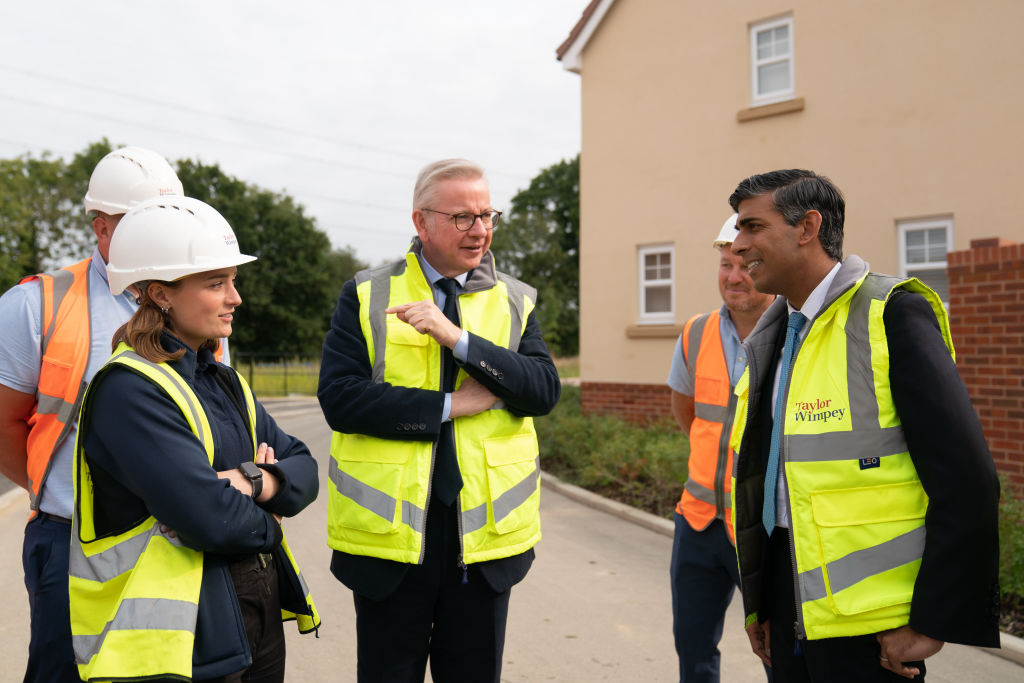Another interest rate rise? What reporting on the mortgage crisis has taught me about the UK housing market


This is Home Front with Vicky Spratt, a subscriber-only newsletter from i. If you’d like to get this direct to your inbox, every single week, you can sign up here.
Good afternoon and welcome to this week’s Home Front. I am afraid we’re a little late today, aren’t we! My excuse is a good one – I’ve been getting the inside track on what on earth has delayed the Renters (Reform) Bill.
Stay tuned…but, for now, back to the business of your weekly housing crisis update.
Over the last decade, I have devoted most of my working life to Britain’s housing crisis. From rip off letting agents’ fees to the unforgiveable squalor imposed on renters by unscrupulous landlords, from runaway house price inflation to the abject failure of politicians on both the left and the right to do anything about it – I’d seen it all.
Or, so I thought.
Since the end of 2021, the economic whirlwind created by inflation and the Bank of England’s interest rate hikes has created a mortgages crisis unlike any Britain has ever seen.
It is, of course, true that mortgage rates have spiked before. In the 80s mortgage rates were at almost 10 per cent and in 1990 they peaked at 15.4 per cent.
But today because house prices hit a historic high in 2022, people borrow more. This, as the housing market analyst Neal Hudson has noted, means that rates of 6 per cent are more like the equivalent of 13 per cent the last time there was a mortgage rates crisis.
If the current rates crisis continues, because house prices were higher when it began, it will be incredibly painful for those affected and could bring about longer-term lasting damage for both the economy and housing market.
I have been a housing market skeptic for years. By that I mean I’ve become increasingly concerned by the historically high house prices which climbed and climbed in the wake of the 2008 global financial crisis. I observed as they locked my friends – private renters on middle incomes without family wealth – out of homeownership and held my tongue as those who could save modest deposits (or were gifted them by their relatives) took on enormous 80, 90 or even 95 per cent mortgages while anyone with serious capital or inheritance was far less exposed to the risk of borrowing.
My skepticism was compounded by interviewing the likes of economist Roger Bootle, who would warn me that low interest rates had “fooled” people into thinking everything was fine with Britain’s housing market when, in fact, it was vulnerable to a downturn.
As the inflation crisis took hold, and as Britain lurched out of the coronavirus lockdowns, I was finishing my book, Tenants. This was the culmination of five years’ worth of reporting which involved speaking to people from all walks of life across the United Kingdom about their housing situation.
In the cold, dark and early days of 2022 I wrote the following on page 216: “as the emerging trend for longer and bigger mortgages shows us, homeowners are going to need support in years to come.”
All it would take, I added, was for inflation to persist (which it has) and the Bank of England to continue hiking their base rate (which they have).
And here we are. One year after former prime minister Liz Truss cemented the mortgages crisis by tanking the economy with her disastrous “mini-Budget”, average mortgage rates remain above 5 per cent and house prices are falling according to several indices.
The Bank of England’s monetary policy committee could increase the base rate from 5.25 per cent to 5.5 per cent this Thursday due to persistent inflation and fears that wage growth could exacerbate it.
If they do, it will be the 15th consecutive rate hike in a row.
Through it all I have spoken to people who might have to sell their homes because they can’t afford their repayments in the brave new world of higher rates.
I have spoken to mortgage prisoners who face repossession.
And, I have spoken to renters who have had their rent increased by their landlords to eye-watering levels.
What has reporting on the mortgages crisis taught me?
Four things:
Firstly, buying a home is not and, crucially, never was a “safe bet”. There’s a saying in psychology that “past behaviour is the best predictor of future behaviour”. Well, the behaviour of Britain’s housing market, vulnerable as it is to external economic shocks, has always been volatile. We don’t yet know how extreme the downturn currently taking place will be and I’ve learned not to make predictions.
Secondly, the cheap credit that was pumped into our economy in the wake of 2008 was a boon to older generations, allowing them to buy expensive homes cheaply and fuel house price inflation which has cost younger adults – like me – who are either stuck renting or with huge mortgages, dearly. It may have been necessary life support for Britain’s economy, but it was a risk which made us all think that we could afford things that most people’s wages simply do not stretch to pay for.
Thirdly, I’ve learned that our politicians are not serious about solving the housing crisis. They have done little to support private renters who have had more attention from the Governor of the Bank of England, Andrew Bailey, than from the Prime Minister, Rishi Sunak. Bailey has acknowledged that rate hikes are hurting private renters, Sunak, meanwhile, has remained extremely quiet about the plight of this demographic and merely paid lip service to the hundreds of thousands of mortgage holders who are struggling with repayments.
And, finally, I am not sure that the aspirational Thatcherite narrative that working hard and buying a home equals success and stability will be left intact by the mortgages crisis of the 2020s. The dream of homeownership is already in tatters. Economists, like those over at Capital Economics, are forecasting that the Bank of England will not start cutting interest rates until the second half of 2024. This will likely exacerbate the house price falls already being reported. If that happens, it could bring about an end to people’s blind faith in housing booms, in the idea that a home will always go up in value. This will have consequences for our economy (which is heavily reliant on mortgage lending) and for our society (because housing wealth fuels adult social care and there isn’t really a plan to support a growing population of older renters). However, I also think the end of one political story could make way for another. I just hope it’s a serious state-led renaissance of affordable housebuilding.
Our economy became hooked on high house prices to give the illusion of growth after 2008 and, if this is anything to go by, political thinking is still clouded by that.
Key Housing

Last week the Conservatives lost a housing battle. Their plan to axe EU regulations about housebuilding and river pollution (nutrient neutrality) in a bid to encourage housebuilding was thwarted by peers in the House of Lords who voted down the proposed amendment.
This is an example of the House of Lords working as intended by providing checks and balances on the House of Commons.
However, I’m not sure that this issue has been resolved.
Environmental experts remain concerned – rightly – about river pollution and housebuilders, rightly, remain concerned about how to get the homes Britain so urgently needs built.
The Housing Secretary, Michael Gove, said that removing this regulation could help to deliver 100,000 new homes.
There is no doubt that these are needed, and I have heard from some local politicians, including a Welsh Parliament member, who believe that the rules have hindered housebuilding in their area.
I also have spoken to others, in areas like Cornwall, who say it’s completely possible to build new homes on virgin land without polluting rivers as long as the right infrastructure is put in place.
There is a nuanced conversation to be had here. But, by pitting the environment and housing against one another, by invoking the European Union and its “red tape” as the villain in this story, the Government turned a nuanced conversation into a culture wars issue which, in the end, means nobody won.
Ask me anything

An interesting question from a reader this week:
“I’m a renter in a House in Multiple Occupancy (HMO) and the landlord has changed our contract. Previously gas and water were included in the rent but now we are being told to take on these ourselves which means one person will have to be the account holder. There are 9 people living here and when we objected and were told we could find somewhere else to live if we didn’t like it. Tenants come and go, so I don’t want to be the account holder. What can we do?”
This is a huge problem with HMOs. You’re effectively living in a giant house share and it’s very understandable that you wouldn’t want to be chasing people you might not know that well for bills money.
Unfortunately, energy and water providers do not allow individual connections for a home that has been divided into separate rooms. This is very different, for instance, to living in a self-contained flat inside a house.
There is no specific tenant law on this so the best advice I can offer is that you should negotiate with your landlord and make sure their HMO licence is valid. If it is not, you can report them to your local council.
Vicky’s pick

Over the weekend I went to see the new A24 film Past Lives starring Greta Lee, Teo Yoo, and John Magaro.
The film is a romantic musing on the idea of having a “soul mate” or, as it is this sort of fatalistic attraction is called in Korean, “In-yun”.
It is the story of the relationship between two childhood friends spanning several decades.
I don’t want to give too much away but the film made me think that, no matter how advanced science becomes, no matter how many psychological research papers are written about attraction, ancient myths and legends which were written to explain the mystery of love – what it is, why it happens and who it happens to – still offer explanations for our feelings where logic, science and reason seem, still, to somehow fall a little too short.
This is Home Front with Vicky Spratt, a subscriber-only newsletter from i. If you’d like to get this direct to your inbox, every single week, you can sign up here.






